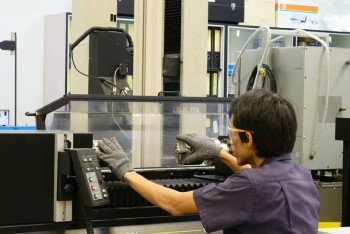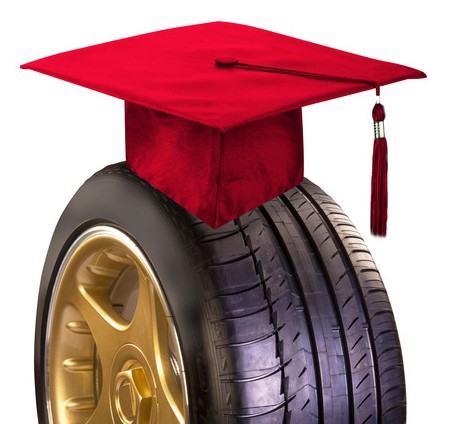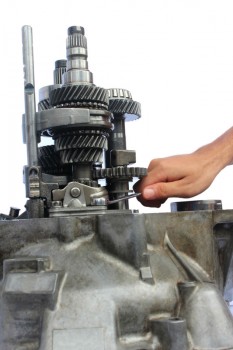It has been said that we should work in order to live and not the other way around but if you are an automobile fanatic then why not consider combining your love for automobiles with a job in the automotive engineering field? When you decide that you want to combine a passion with a career and make a living in the automotive industry then a degree in Automotive Engineering is one of the best first steps to take.
Getting started in Automotive Engineering with an engineering degree
The first step towards a career in the automotive engineering world is to complete the basic requirements in your secondary education so that you are prepared to handle the classes in the program. These basic requirements will give you the skills in math, science and other topics that will be used as you enter the engineering programs. The basic recommendations to enter the bachelor’s degree program include 4 units of English and math, 3 units in natural sciences such as chemistry and physics, as well as units in social sciences and foreign languages. This diverse group of topics will give the beginning college student the necessary background to be successful in the program. Don’t worry if your secondary institution did not have all of these classes available, there is the option to take these courses in your first year of college education and then enter the degree program.
Bachelors of Science in Automotive Engineering
Once you have qualified for an automotive engineering curriculum with the school of your choice there will be a series of basic entry level courses you will be required to complete. These classes include Calculus, Differential Equations, Matrix Algebra, Chemistry, Physics and other basic general studies courses such as English and social sciences that all college degrees much take. Once you have completed the basic courses then your degree moves into the more specialized courses specific to your automotive degree program. These courses focus on mechanical engineering courses such as Statics, Dynamics, Thermodynamics, Manufacturing Technology, Quality Control and Materials Science and they are geared towards automotive specific topics. The goal of this degree is to give you a leg up in the automotive engineering field and give the next generation of graduates a head start in the automotive engineering field with automotive specific experiences and case studies so that the new hire engineer is already familiar with the field.
A Note on Automotive Engineering Bachelors Degree
Keep in mind there many reasons against getting an automotive engineering degree, as opposed to a mechanical engineering degree as your bachelors. Not many automotive bachelor degrees are accredited as of today, and if you want to land a job after school you better make sure that your degree is legit! The other reason to go for mechanical over automotive early on is that mechanical engineering offers a much broader range of engineering principals for you to build on. An automotive engineering degree is very focused on specific elements of design and engineering that are difficult to learn without a strong overall foundation. My recommendation would be to get your bachelors in mechanical engineering and then move on to an automotive engineering masters.
Master’s Degrees in Automotive Engineering
If you choose to continue your education in with a Master’s Degree in Automotive Engineering then there are educational choices available at universities such as Clemson which offers a Master’s Degree curriculum in Automotive Engineering. The master’s program requires 15 credit hours in courses such as Automotive Design, Project Management, Automotive Systems, Systems Integration, Electronics and Manufacturing Systems. Additionally, students in the program are required to earn 15 elective hours in one specialty area and the courses must complement each other and be approved by a faculty advisor.
Ph.D in Automotive Engineering
 For those ambitious students who want to complete the max level of education available in the automotive engineering field then there is also a Ph.D curriculum available through Clemson that allows students to complete course work over a three or four year timeframe and offers a variety of different engineering tracks all within the automotive field. The course requirements vary depending on whether you have a Bachelor’s or Master’s degree but in each case core classes in automotive systems, business, design and system integration must be completed along with multiple technical electives in an automotive specialty area such as manufacturing and materials, vehicle performance, powertrain and drivelines or electronics systems. Finally, Ph.D students must complete a doctoral dissertation and have a six-month internship requirement working in the automotive field. All of these requirements are designed to give the graduate from the program a strong technical working knowledge and experience in the field so they are prepared to be successful when they enter their chosen field.
For those ambitious students who want to complete the max level of education available in the automotive engineering field then there is also a Ph.D curriculum available through Clemson that allows students to complete course work over a three or four year timeframe and offers a variety of different engineering tracks all within the automotive field. The course requirements vary depending on whether you have a Bachelor’s or Master’s degree but in each case core classes in automotive systems, business, design and system integration must be completed along with multiple technical electives in an automotive specialty area such as manufacturing and materials, vehicle performance, powertrain and drivelines or electronics systems. Finally, Ph.D students must complete a doctoral dissertation and have a six-month internship requirement working in the automotive field. All of these requirements are designed to give the graduate from the program a strong technical working knowledge and experience in the field so they are prepared to be successful when they enter their chosen field.
There are multiple schools that have an automotive engineering degree program and each has benefits in location, technical offerings and additional experiences that will help you to earn the degree and experiences that you need to be successful in the automotive engineering field.
Extracurricular activities for the automotive engineering student
Many engineering schools offer a variety of activities that will enhance the educational experience for automotive engineering students. These activities include programs such as internships where the student spends a portion of their time working for a company in the automotive industry or there are competitive programs that pit schools against each other in automotive engineering competitions to design the most efficient, fastest or creative vehicle.

Clemson Deep Orange Project
Another example of a specialty program that enhances the educational opportunities for the automotive engineering student is the Clemson program called “Deep Orange”. The program is designed for graduate engineering students from the automotive engineering program and works with industry partners including both suppliers and original equipment manufacturers (OEMs) to design and integrate a breakthrough product that utilizes new designs, materials, processes and methods and gives the student hands on experience in automotive design. One of the keys of this program is to encourage the student to think of the overall automobile and consider the ecosystem and sustainability needs when bringing a new design to market.
Benefits to following the automotive engineering educational path
When you decide to follow a career path in the automotive engineering field you will receive the education and experiences you need to begin your career immediately after graduation. You will have a step up on other job applicants since you will already have a strong basis in the automotive engineering field and will take less time to come up to speed to be productive in the work environment. No matter what field of automotive engineering you choose to specialize in you will have numerous job opportunities to choose from and the educational experiences needed to be successful in your field. The automotive industry continues to grow and be challenged to become more efficient, sustainable and perform better and automotive engineers will be on the design teams that bring the vehicles to market designed to meet these challenges.


